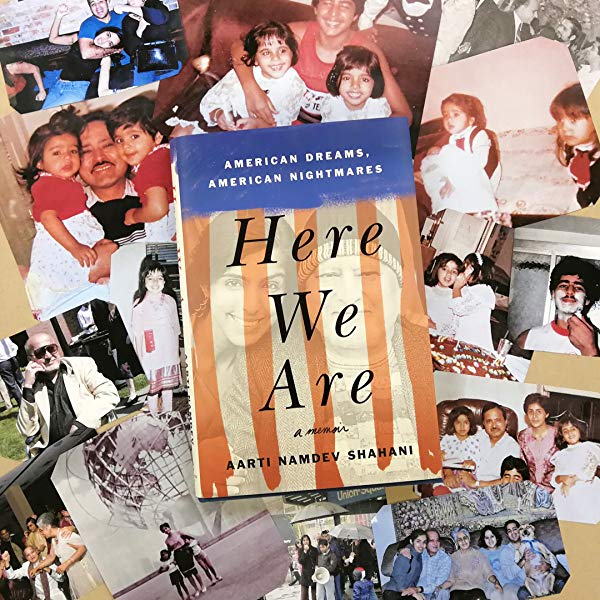Aarti Namdev Shahani’s new memoir captures the complexities of immigration to the United States.
By Abby Hopkins
The irony of American freedom is its limits. While freedom is promised in the Constitution, some Americans are not granted the freedom to hear a knock on their door or see a police officer on the street without tensing up. For them, the gap between legality and reality is too wide.
Aarti Namdev Shahani and her family experienced the realities of the broken judicial and governmental systems after they moved to New York City from India in 1981. After years of avoiding the past, Shahani decided to take the risk and tell her family’s story in a memoir released this month called Here We Are: American Dreams, American Nightmares.
Upon first glance at Shahani’s life, one may see a cookie-cutter American dream story. Shahani attended a private prep school, the University of Chicago and Harvard University on scholarships before engaging in activism through a nonprofit and, now, journalism as an NPR correspondent in Silicon Valley.
Seemingly, she made it, making her book all the more necessary to write; nothing is truly as it seems.
Rather than lavishing in her own successes, Shahani shares the raw peaks and valleys of a normal family in abnormal circumstances, just trying to live in a country that pushes back on their aspiration to do so.
Switching between past and present memories, Shahani tells their story with wittiness, vulnerability and detailed characterization of her family members that makes the reader feel as though they’re watching the events play out. She digs into her family’s past through the detail-oriented lens of her curious, journalistic mind.
Early pieces of the story center around how her parents met, married and moved to America into a diverse, roach-infested apartment complex in Flushing, Queens. Shahani’s father set out immediately to find work, but struggled, while her mom landed a job in a bridal shop. (The memoir frequently proves that the American dream is for women, too.) After three years, they received green cards, which guaranteed permanency, or so they thought.
From there, the stories mostly center around Shahani and her father, who depict two opposite facets of American immigration. Shahani embraces American modernity and finds herself with impressive opportunities to climb society’s ladder. Her father, a quiet, traditional man with a knack for numbers, finds himself in multiple heartbreaking situations that create unrest for his family in addition to the challenges already in place for newcomers. He is convicted, alongside his brother, of selling electronics to the Cali drug cartel through his store in the city.
Throughout his story, Shahani takes the reader on her journey to fight for her family and avoid her father getting deported. Along the way, she finds more similarities between the two of them than she ever dreamed possible, and gains a newfound appreciation and love for the man she once considered a barrier to her teenage rebellion.
Shahani studies the law to help her father’s case, and, although the legal jargon can be difficult to understand for someone not well-versed in it, she paints a realistic picture of the complexities of the broken justice system.
The Shahani story is heavily impacted by historic events, including the 1996 immigration bill, 9/11 and the creation of Immigration and Customs Enforcement (ICE) in 2003, that pushed back against advancements, leaving Shahani in what she called a “more than decadelong anxiety attack.” The ups and downs in the story leaves the reader in anticipation, unable to leave the book alone until discovering what happens to the Shahani family.
Here We Are: American Dreams, American Nightmares is a story of family bonds and family conflicts, injustice and justice, feminism and tradition, success and failure, ideals and realities.
It begs the reader to question how the Shahani story would be different if their story began today, in a harsher systemic climate toward immigrants where, now, through President Donald Trump’s most recent immigration-focused proclamation, even legal immigrants must provide proof of health insurance before entering the country. How much more difficult would it have been for their family to migrate? How much more would they feel they don’t belong?
In the midst of divisive conversation on immigration in our country, Shahani’s story makes one thing clear: We need to be listening.
Hear Aarti Namdev Shahani speak on an immigration panel at the Texas Book Festival on Saturday, Oct. 26 at 10 a.m. in the C-SPAN 2 tent.



